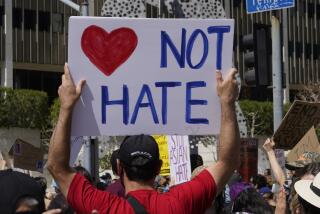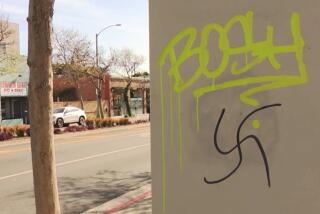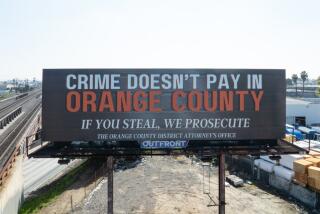Police Publish Guide to Fight Hate Crimes
The increase in hate crimes, dramatized by burning crosses and ethnic slurs scribbled across churches and synagogues, has prompted the San Diego Police Department to publish a pamphlet designed to combat the crimes and record their frequency.
The pamphlet, the first of its kind, is also a result of modified state codes more clearly defining hate crimes.
Police documented 126 hate crimes in San Diego and 147 countywide since November, according to John Graham, a Police Department crime prevention specialist and co-author of the hate crime pamphlet.
The four-page pamphlet, released this week and available at any of the city’s 10 community relations offices, tells how to identify and report a hate crime.
A hate crime, as defined by the California attorney general’s office, “is any act or attempted act to cause physical injury, emotional suffering or property damage, which is or appears to be motivated, all or in part, by race, ethnicity, religion or sexual orientation.”
When reporting a hate crime, the pamphlet says, try to report the crime from the scene and get a detailed description of the assailant.
Documentation of hate crimes began shortly after the California Penal Code was revised early last year to include guidelines on crimes committed on the basis of race, ethnicity, religious and sexual orientation of the victim, Graham said.
Before the code was updated, Graham said police documented hate crimes under a different category, typically vandalism or battery. With a more clear definition of hate crimes now on the books, law enforcement agencies expect to keep better tabs on their degree and frequency, he said.
In addition, those convicted of hate crimes may face extra charges, said Graham, who constructed a scenario to illustrate his point:
“Say one person is swinging a baseball bat and verbally abusing another person because of race, ethnicity or sexual orientation--that used to be (only) battery. Now it is a hate crime and can amount to additional charges,” Graham said. A hate crime carries a maximum penalty of six months in jail and a $5,000 fine.
Graham cautioned, however, that verbal affronts alone do not constitute a hate crime unless they are backed up with the threat of violence.
“Hopefully with educating the public on what hate crimes are and how to report them, we can improve on the percentage of people caught,” Graham said, adding that most hate-related crimes go unsolved.
Of the 147 hate crimes documented since November, only 12 have led to arrests, he said.
More to Read
Sign up for Essential California
The most important California stories and recommendations in your inbox every morning.
You may occasionally receive promotional content from the Los Angeles Times.










